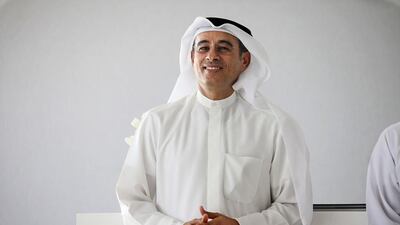Emaar Properties chairman Mohamed Alabbar expects the global economy to have a "long U" shaped recovery and be on a better footing by June of next year.
“I am optimistic..by next year June, we could be in much better shape than we are (today),” Mr Alabbar said on Tuesday at the Annual Investment Meeting.
Speaking about the recovery of the global economy “It will be a long U because the effect on society is huge.”
A U-shaped recovery unlike a quick V-shaped rebound, means the economic impact of the pandemic will last longer with employment, growth, manufacturing output remaining subdued for one to two years before they recover. Mr Alabbar's comments are similar to HSBC's head of global foreign exchange strategy David Bloom.
"It is much more likely that we are in this kind of U with a jagged bottom scenario, and the [US] dollar kind of does well," Mr Bloom told CNBC in June.
The global economy is in the midst of a recession, set to be its worst since the Great Depression due to the pandemic, after supply chains were disrupted, the travel industry came to a halt and countries implemented lockdowns to contain Covid-19.
In its latest World Economic Outlook this week, the International Monetary Fund estimated global output will shrink 4.4 per cent this year with a sluggish and uneven recovery in 2021.
The coronavirus is a “big attack and was not a speed bump,” Mr Alabbar said.
“This thing was a nuclear bomb into the balance sheet of a company or into a business model," he said. "Those who built their businesses carefully, manage their cost very well, manage their debt very well, they will have less pain.”
The pandemic impacted all industries and sectors across the globe, he added.
“Tourism is almost dead so all services related to tourism are suffering. Entertainment is totally destroyed therefore you need to rebuild back," Mr Alabbar said.
"People think that food delivery (industry) is healthy but it is not. During the pandemic, people are scared to even place an order. The real estate sector is having a hard time because we are not confident of what will happen to the economy.”
Addressing the AIM, UAE minister of economy, Abdulla bin Touq said the Emirates will continue to build a wide network of active commercial partnerships with the strongest global economies and to access new and emerging markets.
“We will maintain the principles of openness, liberalisation of trade and facilitating the movement of goods and services," he said. "We will actively contribute to the development of international trade and support of the multilateral trading system."
The UAE's future foreign investment plans aim to define the country as a global investment hub that attracts capital, he said.
The UAE's strategy to diversify its economy will create investment opportunities in research and development, innovation, advanced industries, energy, communication, blockchain, artificial intelligence, robotics, genetics, and many other sectors, he said.
In June, the UAE ranked 19th in the 2020 Kearney Foreign Direct Investment Confidence Index. The country was among three emerging markets – in addition to Brazil and China – ranked on the index, which is an annual survey of global business executives that lists markets that are expected to attract the highest level of investment in the next three years.
The UAE has taken various measures to attract foreign investment as part of efforts to reduce the country’s reliance on oil revenue and diversify its economy. In November 2018, it introduced a new FDI law and in July 2019 it announced a list of 122 economic activities across 13 sectors, in which foreign investors would be allowed complete ownership.
Sweeping visa changes, reduced fees and the removal of administrative barriers have also boosted the amount of investment coming into the country.


